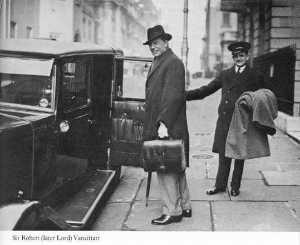 Last Wednesday, I learnt a new word that filled me with a mixture of glee and shame at Hans Vaget’s lecture Vansittartism Revisited. Thomas Mann, Bertolt Brecht, and the Threat of World War III at The American Academy Berlin.
Last Wednesday, I learnt a new word that filled me with a mixture of glee and shame at Hans Vaget’s lecture Vansittartism Revisited. Thomas Mann, Bertolt Brecht, and the Threat of World War III at The American Academy Berlin.
“Vansittartism” is a Germanophobic doctrine, set out by former British foreign minister Lord Vansittart in his BBC radio addresses and book Black Record: Germans Past and Present (1941). It states that there is no difference between German leaders (at that time the Nazis) and the German people.
According to Vansittart, the Germans are characterised by “envy, self-pity and cruelty” and Nazism had “finally given expression to the blackness of the German soul”. He based his view on the fact that the Germans had been involved in five wars in the past 100 years (the three wars of German unification and the first and second world wars.) His analysis completely ignored the role of Austria, where Hitler was born and his views formed, (like the Austrians themselves, who in an act of collective amnesia forgot their Nazi past and blamed the Germans.)
As you can imagine, I was nudging the Bavarian with glee during this definition of his people. When I was young, I read Roald Dahl’s The Twits, and I think it is the book that has most defined my approach to marriage – a series of pranks and oneupmanships. The glee came tinged with shame, because Vansittart’s rhetoric is both ridiculous and racist. As Hannah Arendt’s Eichmann in Jerusalem: A Report on the Banality of Evil makes clear, peoples of every occupied country (except maybe the Danes) were complicit in the terrible crimes committed during WWII.
The lecture, however, provided food for thought. Vaget focussed on the reception of Vansittart’s ideas in the German exile community. Famously, it was a matter of contention between Thomas Mann and Bertolt Brecht in the USA. While Brecht dismissed Vansittartism completely (as a communist, he made a strong distinction between the German people and those in power), Mann was more ambivalent. His thoughts on Vansittart’s ideas varied at different times in his life, but the lecture proposed that overall, he took Vansittartism seriously and his view was closer to that Willy Brandt – at that time in exile in Sweden.
What is clear, however, is, notwithstanding the fact that Vansittartism is a racist product of the British Empire at war with Germany, the questions it raises – Why the Germans? How could a country that produced some of Europe’s greatest intellectuals be responsible for such barbarity? Who is to blame? – are still relevent.
Filed under: Germany, history, Literature
